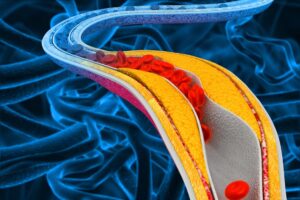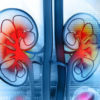Atherosclerosis (Hardened Arteries) Treatment in New Jersey
 Some diseases and illnesses make themselves known right away, while others like atherosclerosis may not display symptoms until they’ve progressed. Fortunately, patients in northern New Jersey with hardened arteries can turn to the medical professionals at Bergen Medical Associates for treatment. Our staff includes experienced and passionate internal medicine specialists who can help you better understand this condition and how to manage it.
Some diseases and illnesses make themselves known right away, while others like atherosclerosis may not display symptoms until they’ve progressed. Fortunately, patients in northern New Jersey with hardened arteries can turn to the medical professionals at Bergen Medical Associates for treatment. Our staff includes experienced and passionate internal medicine specialists who can help you better understand this condition and how to manage it.
What Is Atherosclerosis?
Atherosclerosis, also known as hardened arteries, is a condition that occurs when plaque has built up in the walls of the arteries. Made up of fat, cholesterol, calcium, and more, plaque is a sticky substance that can become hard and thick over time. Arteries carry blood from the heart to the organs and tissues throughout the body. Enough plaque buildup can create health problems as the arteries begin to narrow, and less blood can move through them. The pressure caused by this limitation of blood flow can even result in the formation of a blood clot. The gradual nature of the whole process means you may not even notice it is happening.
Atherosclerosis is quite common. In fact, nearly 50% of Americans between the ages of 45 and 84 are dealing with atherosclerosis without even realizing it.
What Are Atherosclerosis Signs and Symptoms?
Atherosclerosis symptoms don’t often show themselves early on. It is only once the artery has become very narrow that sufferers might see the signs. The symptoms you have will depend on which area of the body the blockage is located in.
Heart
Atherosclerosis may result in coronary artery disease (CAD), which is often accompanied by chest pain, dyspnea (shortness of breath), dizziness, and heart palpitations. CAD may even lead to a heart attack.
Lower Body
If you experience atherosclerosis in your legs and feet, you could be diagnosed with peripheral artery disease (PAD), which is characterized by poor blood flow to the limbs. This can result in muscle pain, redness on the skin, and aches and pains in the toes and feet when at rest.
Digestive System
If you aren’t getting proper blood flow to the digestive system, you could suffer from mesenteric ischemia, a loss of blood flow to the small intestine. This condition is accompanied by abdominal pain after eating, diarrhea, nausea, and vomiting.
Kidneys
Narrow arteries to the kidneys may result in renal artery stenosis. The condition may bring about headaches, drowsiness, edema, high blood pressure, and more.
Brain
Reduced blood flow to the brain can cause a stroke. You may experience numbness, slurred speech, dizziness, loss of vision, or drooping on one side of your face.
What Are the Risk Factors and Causes of Atherosclerosis?
One of the most prominent risk factors is age. Males over 45 and females over 55 are at a higher risk. Another risk factor is your family history. Those with a history of cardiovascular disease in their families should be on the lookout. Individuals who smoke or use tobacco, have diabetes, high blood pressure, and high cholesterol are also at risk, as these factors tend to damage the arterial lining over time.
How Is Atherosclerosis Diagnosed?
Often, the best defense against atherosclerosis is to simply meet with your doctor and allow them to perform a physical exam. They will also discuss your family history, diet, and lifestyle. If your doctor suspects hardened arteries, they will likely order blood tests and other tests. These can include:
- Angiographies
- Chest X-rays
- CT scans
- Echocardiograms
- Carotid ultrasounds
If your doctor believes the hardened arteries are in a specific location, they may send you to see a specialist, such as a cardiologist for the heart, a nephrologist for the kidneys, or a neurologist for the brain.
How Is Atherosclerosis Treated?
Based on your symptoms, age, and several other factors, doctors will formulate a treatment plan for your hardened arteries. This may involve:
- Making changes to your diet and lifestyle, including increasing exercise, quitting smoking, and reducing saturated fats, red meat, and sodium
- Prescribing medications aimed at lowering cholesterol or blood pressure or preventing blood clots
- Recommending surgery, such as angioplasty, atherectomy, or vascular disease bypass to widen arteries and remove clots
The best treatment plan for you will depend on how narrow your arteries are, your age, other health conditions you have, and more.
Choose Bergen Medical Associates for Atherosclerosis Treatment Near You in New Jersey
For those in northern New Jersey, Bergen Medical Associates offers a welcoming environment full of board-certified professionals. If you want to learn more about atherosclerosis treatment or meet with an experienced doctor, our internal medicine team is here for you. We have locations throughout Bergen County (Emerson, Montvale, Northvale, Paramus, and Ridgewood, NJ) and offer telehealth visits for added convenience, so you can find treatment near you. Contact us today or request an appointment to get started.












